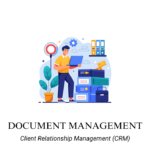Introduction
A client portal is a secure online platform that allows legal professionals to communicate, collaborate, and share information with their clients efficiently. It acts as a centralized hub where clients can manage their profiles, track case progress, schedule appointments, handle tasks, and communicate with their legal teams in real-time. The portal enhances transparency and convenience, allowing both clients and legal teams to stay connected without the need for constant phone calls or email exchanges.
In today’s fast-paced digital world, legal clients expect more convenience and access to their case details. With 77% of law firms recognizing the importance of technology in improving client satisfaction (Clio Legal Trends Report), a client portal becomes a key tool in delivering an excellent client experience. It provides clients with instant access to their case information, improving communication and fostering trust in the attorney-client relationship.
Purpose
The main purpose of a client portal is to enhance communication and collaboration between legal professionals and their clients. Traditional methods of communication, such as emails and phone calls, can lead to delays, miscommunication, or data being lost in the shuffle. A client portal centralizes everything, providing real-time access to case updates, documentation, appointments, and tasks, giving clients greater transparency and control.
For legal professionals, a client portal reduces the need for constant back-and-forth communication, streamlining workflows and enhancing overall productivity. It allows them to keep clients updated, delegate tasks, and manage their schedules—all from a single platform.
Benefits and Use Cases
- Enhanced Client Satisfaction and Transparency: One of the primary reasons law firms adopt client portals is to improve client satisfaction. Clients want easy access to information about their case, and client portals give them just that. According to the ABA’s 2021 Legal Technology Survey Report, over 40% of clients prioritize transparency and regular updates from their legal representatives. A client portal delivers this by giving clients direct access to case files, milestones, and updates, providing peace of mind and fostering trust.
- Reduced Administrative Overhead: Without a client portal, legal professionals often spend a significant portion of their time responding to client inquiries, providing updates, or scheduling appointments. A client portal automates many of these processes. Clients can access the information they need on their own, significantly reducing the administrative workload for law firms. This allows lawyers to focus more on legal work and less on administrative tasks.
- Improved Collaboration and Communication: The client portal acts as a single communication hub where clients and legal teams can exchange messages, documents, and updates securely. This minimizes the need for lengthy email chains or phone conversations, ensuring that communication is centralized and well-organized. This real-time communication is especially useful in cases where time-sensitive updates are critical.
- Security and Compliance: Client portals are designed with security in mind. In an industry where confidentiality and data security are paramount, a client portal provides encryption and secure login features, ensuring that sensitive information is shared securely. Many portals are also designed to comply with legal industry regulations, such as GDPR or HIPAA, adding an extra layer of protection.
- Increased Accessibility and Convenience: Client portals are typically available 24/7 from any device with internet access, allowing clients to access their case information or communicate with their attorneys at their convenience. Whether they need to check the status of their case or review a document, clients can do so without waiting for business hours.
Features of the Client Portal
Profile Management
Definition: Profile management in a client portal allows clients to maintain and update their personal information, contact details, case-related data, and other relevant documentation. It provides clients with the autonomy to update their profiles without needing to contact the law firm directly.
Purpose: The purpose of profile management is to ensure that clients’ information is always up-to-date, facilitating better case management. If a client’s address changes or if they acquire new legal documents, they can easily upload and update this information in their profile.
Use Case: Imagine a client who has moved to a new state and needs to update their address for an ongoing divorce case. Instead of calling the law firm and waiting for the admin team to make the change, they can simply log into the portal and update their address. This ensures that any legal correspondence is sent to the correct location without delay.
Benefits:
- Reduces the need for manual data entry by legal staff.
- Ensures client information is accurate and up-to-date.
- Enhances client engagement by giving them control over their own data.
Appointment Management
Definition: Appointment management allows both clients and legal professionals to schedule, reschedule, or cancel appointments directly through the portal. It provides real-time updates on available slots, eliminates the need for back-and-forth coordination, and integrates with personal calendars (such as Google Calendar or Outlook).
Purpose: The purpose of appointment management is to streamline the scheduling process, ensuring that clients can book appointments at their convenience, while legal professionals can better manage their time and avoid scheduling conflicts.
Use Case: A client involved in a personal injury lawsuit needs to discuss case updates with their attorney. Instead of calling the office and waiting for a callback, the client can log into the portal, view the attorney’s availability, and schedule a meeting at a time that works for both parties. The system automatically sends reminders to both parties, ensuring the meeting is not missed.
Benefits:
- Streamlines appointment scheduling for both clients and attorneys.
- Minimizes scheduling conflicts and missed meetings.
- Automatically sends reminders to reduce no-shows.
- Syncs with external calendars to keep all appointments in one place.
Task Tracking
Definition: Task tracking allows legal teams and clients to assign, track, and complete tasks related to a case. Clients can see what tasks have been completed, what’s pending, and any upcoming deadlines. Attorneys can delegate tasks to clients, such as filling out forms or gathering documents, and track their completion in real-time.
Purpose: The purpose of task tracking is to ensure that all parties are on the same page when it comes to case responsibilities. It helps attorneys keep track of client responsibilities, while clients can stay informed about what’s expected of them.
Use Case: In a real estate transaction case, a client is required to submit a series of documents to their attorney. The attorney creates tasks within the portal, specifying which documents need to be uploaded and by when. The client is notified of these tasks and can track their progress through the portal. This ensures timely submission of documents without the need for constant reminders.
Benefits:
- Provides transparency by allowing clients to see their progress.
- Reduces the need for constant follow-ups by attorneys.
- Ensures deadlines are met by providing automated reminders.
- Enhances accountability for both clients and legal teams.
Client Communication
Definition: Client communication within the portal allows for secure, real-time messaging between clients and legal professionals. It provides a centralized space for communication, where clients can ask questions, seek updates, or provide additional information related to their case.
Purpose: The purpose of client communication features is to streamline the exchange of information between clients and attorneys. Rather than relying on email or phone calls, which can lead to delays or confusion, a client portal keeps all conversations organized in one place.
Use Case: A client who is unsure about an upcoming court appearance sends a message to their attorney via the client portal to clarify the date and what documents they need to bring. The attorney responds quickly, and the entire conversation is documented within the portal for future reference.
Benefits:
- Ensures secure communication between clients and legal teams.
- Centralizes all case-related communication in one place.
- Reduces reliance on emails, making it easier to track conversations.
- Provides clients with a direct line to their attorney for urgent queries.
Conclusion
A client portal is an indispensable tool for modern law firms looking to enhance client satisfaction, streamline communication, and reduce administrative overhead. By offering features like profile management, appointment scheduling, task tracking, and real-time communication, a client portal ensures a seamless client experience while improving operational efficiency. In a time where client expectations are higher than ever, adopting a client portal can be a game-changer for legal professionals seeking to provide top-tier service while maintaining productivity.
Guide to find best Client Relationship Management (CRM) for lawyers
CHECK OUT CRM TOOLS ON DIRECTORY OR CLICK HERE


